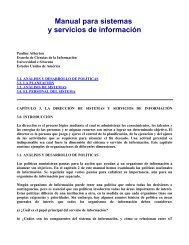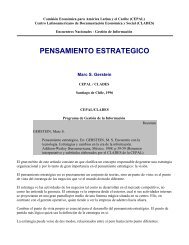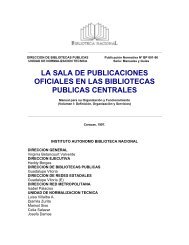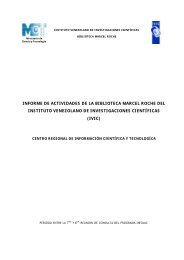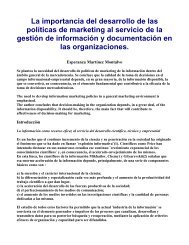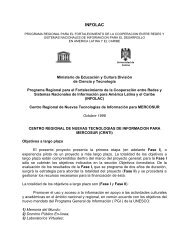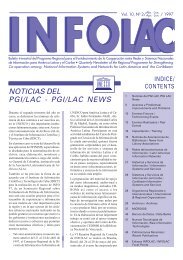REPORT ON THE FIRST GHANA INTERNETWORKLNG ... - Infolac
REPORT ON THE FIRST GHANA INTERNETWORKLNG ... - Infolac
REPORT ON THE FIRST GHANA INTERNETWORKLNG ... - Infolac
You also want an ePaper? Increase the reach of your titles
YUMPU automatically turns print PDFs into web optimized ePapers that Google loves.
<strong>REPORT</strong> <strong>ON</strong> <strong>THE</strong> <strong>FIRST</strong> <strong>GHANA</strong> <strong>INTERNETWORKLNG</strong> TECHNOLOGY<br />
WORKSHOP UNIVERSITY OF <strong>GHANA</strong>. LEG<strong>ON</strong>: FEB. 3rd, FEB. l4, l997<br />
BY<br />
Mrs. Christine O. Kisiedu<br />
Balme Library<br />
Urliversity of Ghana<br />
Legon Accra<br />
Mr. MohammedSani-Abdulal<br />
Departnent of Computer Science<br />
University of Ghana<br />
Legon Accra<br />
Introduction<br />
The Ghana Internetworking Technology Workshop (GITW97) hosted by the University of Ghana during the period<br />
January 30,1997 February 15, 1997 is the first of a series of workshops to be organised jointly by the University of<br />
Ghana and the Ghana National Committee on Internet Connectivity (GNCIC) for Public Sector Institutions. As one of<br />
the activities of the InfoDev Project, this workshop was initiated by UNESCO and ITU (International<br />
Telecommunication Union) and funded by UNDP, ITU, PAC (Physics Action Council). NCS (Network Computer<br />
Systems Ltd.) also collaborated closely with the GNCIC in making the Workshop happen.<br />
The workshop focused on assisting institutions/organisations that are either not yet connected to the Internet or are<br />
in the process of doing so to develop the necessary skills required to set up the networking infrastructure and to fully<br />
utilize the facilities of the Internet. In conformance with the objectives of ISOC the goals of this series of workshops<br />
are:<br />
1. To train a critical mass of trainers/professionals in network infrastructure, transport, services and<br />
management to be able to support an extension of meaningful Internetrelated activities within the<br />
organizations and institutions represented;<br />
2. To identify and share individual and institutional contacts as well as information sources that will assist the<br />
process of national development, using international Internet connections;<br />
3. To build robust professional linkages between all participants in the programmes so that the<br />
mentorstudent and peer relationships formed during the workshops will remain strong and be continuously<br />
useful well beyond the workshops;<br />
4. To increase the level of cooperation among existing projects and activities for establishing data networks in<br />
Ghana in particular and African and other developing countries in general;<br />
5. To train a group of people who will return to their organizations to teach others what they have learnt at the<br />
workshop;<br />
6. To set up a nucleus national computing and networking technology training centre at the University of<br />
Ghana that will promote the acquisition and enhancement of the requisite networking skills.<br />
Organisation of the Workshop<br />
The Workshop was the culmination of a yearlong activity by the GNCIC aimed at promoting the InfoDev Project.<br />
The committee has a membership of ten people representing government ministries and parastatal organisations,
universities and research institutions and a few private sector organisations. Based in Legon, it is chaired by the<br />
University Librarian, Mrs. Christine Kisiedu, with Mr. Moharnrned Sani Abdulai, a lecturer at the Department of<br />
Computer Science, Legon as Secretary.<br />
Responsibility for organising and running the Workshop fell on these two people. For practical purposes, the<br />
Workshop Secretariat was located in the Balme Library, with Mrs. Kisiedu as overall Workshop Coordinator. She<br />
was closely assisted by Mr. Abdulai who also doubled as an Instructor. Brian Candler, Senior Instructor, was<br />
designated as Workshop Director.<br />
The Workshop was opened at 10.30 a.m. on 3rd February by the Chief Director of the Ministry of Environment,<br />
Science and Technology on behalf of the Minister who was unable to attend personally due to unforseen<br />
circurnstances. A paper was read on her behalf. The ViceChancellor of the University of Ghana, Professor Ivan<br />
AddaeMensah, chaired the function and the Resident UN Coordinator, Mr. Abdoulie Janneh, represented the UN<br />
agencies involved in the project and made a presentation which provided a context for the Workshop.<br />
Infrastructure, Equipment and Support<br />
The computing equipment, communication infrastructure, and support services were provided by the UNDP, ITU,<br />
NCS, the Department of Computer Science,Legon, the Planning Unit, and the Balme Library of the University of<br />
Ghana.<br />
The equipment received from UNDP included one SUN SPARc station 5 (plus accessories), three Dell DIMENSI<strong>ON</strong><br />
P133v Workstations, one Cisco router 2509 (plus accessories), UTP CartS 4 pair cables, two SMC 12port hubs,<br />
four SMC 6port hubs, three Zyxel (Flite 2864) 28.8 Kbps Voice/Fax modems, connectors, Radio Shack power<br />
converters/stepdown transformers, one overhead projector, etc<br />
ITU paid for the books and picked up the bill on participants' accommodatlon and feeding. Twenty copies of each of<br />
the following books were received:<br />
TCP/IP Network Administration<br />
Building Internet Firewalls<br />
Routing in the Internet<br />
Managing Internet Information Services<br />
DNS & BIND<br />
Practical Unix & Internet Securitv (2ed)<br />
The Whole Internet User's Guide<br />
NCS loaned the workshop extra networking and communication equipment (modems, Cisco pro, Cylink Spread<br />
spectrum) and provided Internet connectivity throughout the workshop penod free of charge. The Plarming Unit of<br />
the University provided classroom and laboratory facilities comprising two large rooms (for Tracks 1 & 2, and for<br />
Track 3 respectively), and 14 AT&T Desktop computers. These were supplemented by 12 Digital Workstation and a<br />
Digital Priories server loaned to us by the Department of Computer Science. The Balme Library also loaned us two<br />
PCs and five network cards.<br />
Curriculum<br />
The curriculum was initially based on the curriculum of the ISOCWORKSHOP on Internetworking Technology for<br />
developing countries However, considering the background of the students, and taking into account the new<br />
developments, it was revised to accommodate the situation on the ground. The revised schedules for the various<br />
tracks are attached to this report as Appendix I.<br />
Resource Faculty<br />
The resource faculty of this workshop was initially designed to consist of four foreign and five local instructors. The<br />
assignment of instructors to tracks based on the initial faculty strength and the backgrounds of the instructors was<br />
as follows:<br />
Track 1 and Track 2:<br />
Brian Candler (Consultant, UK) ChiefInstructor/Course Director
Mouharnet Diop (Sonatel, Senegal)<br />
William Tevie (NCS,Ghana)<br />
MoharnrnedSani Abdulai (University of Ghana, Legon)<br />
Dr Nii Quaynor (NCS,Ghana)<br />
Kofi Arthiabah (AAU,Ghana)<br />
Track 3:<br />
Dr. Alex Coranthin (Senegal) Track Leader<br />
Altaf Hussein Dossa ([nformation Systems Advisor, Mauritius)<br />
William Anim Dankwa (Nastlic/CSIR, Ghana)<br />
Unfortunately, Dr. Coranthin failed to arrive. This called for a redistribution of the original work load. The chief<br />
instructor in consultation with Mr.Dossa therefore asked Mr. Abdulai to join the track 3 faculty, which he willingly<br />
accepted to do.<br />
Participation<br />
The workshop attracted participants from twelve public sector institutions, two private sector organizations and one<br />
nongovernmental organization. The following institutions and organizations were represented:<br />
Public Sector Institutions<br />
Forestry Commission<br />
Ministry of Finance<br />
Ministly of Food and Agriculture<br />
Ministry of Health<br />
Ministry of Inforrnation<br />
Ministry of Trade<br />
Volta River Authority<br />
Universities/Research Organisations<br />
University of Cape Coast<br />
University College of Education, Winneba<br />
University for Development Studies<br />
University of Ghana<br />
University of Science and Technology<br />
Private Sector Institutions<br />
Giant Metro<br />
Network Computer Systems NCS)<br />
NGOs<br />
Voluntary Work Camp Association (VOLU)<br />
Highlights and Issues Ralsed<br />
The highlights of this workshop were as follows:<br />
Setting up of Linux boxes for ethemet and PPP connectivity<br />
Setting up of UUCP Email leaf nodes<br />
Linux System administration<br />
Cisco router configuration<br />
Security issues<br />
Integration of TCP/IP with Novell<br />
Setting up of quality information services<br />
Engineering of Web Sites Contextual and Design Issues<br />
CGI programming<br />
Creation of the off1cial web site of the workshop<br />
Participants without previous UNIX experience had been asked to arrive on 2931 January for a preworkshop
session the main on 3rd,February. actually happened that participants arrived the<br />
29th. Workshop proper on 3 after the formal opening, the Track course had be<br />
readjusted end a days earlier, 12 of 14th 1997.<br />
Funding Logistics<br />
Workshop had seed money. activities or that needed be paid before during the<br />
had to obtained either credit or personally by Mrs. Kisiedu Mr. Abdulai.<br />
were three sources of available to Workshop:<br />
Pledges made by UNDP and lTU, and<br />
UNDP Funding<br />
pledged $50,000 thousand US for running Workshop. As been already, the<br />
of this into the and delivery equipment and and pay for services of foreign<br />
instructors the airfares, fees, DSAs and UNDP (New asked the<br />
Office to to Mrs. Kisiedu the of $4,528.00 be used for the feeding,<br />
transportation and other of Foreign and for procurement of and equipment may<br />
required. This not to released until were presented.<br />
This instruction unworkable and inconvenient to organizers. UNDP, responded our<br />
plea flexibility and us an imprest" of (two U.S. Dollars) enable the<br />
to proceed This sum received by Mrs. Kisiedu. enabled us purchase minor<br />
items that needed urgently setting the network, to procure of stationery.<br />
We needed to rent telecommunication equipment as PABX NCS, our local<br />
and the Internet Service ISP). The is to highly in the they assisted<br />
Workshop with loans and in setting up and the courses. financial statement<br />
total expenditure has been provided as II to report.<br />
IIA relates expenses covered UNDP funds. nonarrival of Alex a Senior<br />
from Senegal, resulted in reasonably substantial from $4,528.00 given We are that<br />
UNDP allow us keep this as money for next Workshop for August,<br />
ITU Input<br />
Although lTU pledged $25,000 the Workshop the organisation it known at the of<br />
the that due exchange rate it would be able provide$ 21.000 sum is cover<br />
participants and to for stipends local instructors 15,750 ) well as In order maximize<br />
the ITU input enable us even, it decided that proposed diems budgeted<br />
participants be This was view of extremely low fees they charged, and importantly, due<br />
the fact most, if all participants, were either paid per by or later claim allowances<br />
from organisations the duration the Workshop.<br />
Participants Registration<br />
Participation the Workshop a token of ¢50,000, respect of Sector, and University<br />
and ¢ for Private participants.<br />
There a total 40 registered 30 of were resident. majority were the sector<br />
therefore, possible income from registration even lower. Much of is yet be paid to the<br />
of the Sector's payment The sum expected be realized registration is<br />
($392.16).
The decision to charge low fees had been arrived at in Paris during a meeting between the GNCIC and our foreign<br />
collaborators to discuss the lnfoDev Project in general and the modalities of this Workshop in particular. The low<br />
fees were supposed to attract people to participate in the workshop. We accepted it with the understanding that<br />
funds would be provided for accornmodation and feeding of participants This situation was, however, not reflected<br />
in either the paris meeting report on the project document, and was not understood by the international donors until<br />
just be fore the start of the courses.<br />
Organization<br />
The organization of this workshop was characterized by several setbacs. First was the postponement of the initial<br />
start date of the workshop from November, 1996 to February, 1997.This was due to several problems including, the<br />
nonarrival of the equipment, difficulties in the recruitment of international instructors, and communication problems.<br />
The absence of a single cornmunication channel between our collaborators and us was a source of considerable<br />
confusion. The assistance of a Programme Of ficer could have helped in this and other respects.<br />
The Workshop's orgallisers also faced unforseen, lastminute difficulty in obtaining classroom and laboratory<br />
facilities. This state of affairs was due to a communication gap between the GNCIC and the university hierarchy.<br />
Though the classroom and laboratory facilities were eventually provided by the Planning Unit of the University of<br />
Ghana, this initial hitch was a great inconvenience. Instead of setting up the system, we were busy moving<br />
equipment and communication facilities to new premises. This resulted in considerable delay in the commencement<br />
of teaching on day one, after the opening ceremony.<br />
A major constraint was lack of funds for the GNCIC to promote InfoDev in Ghana, and specially to undertake the<br />
background preparation for running the Workshop. The GNCIC had been operating for exactly 12 months with<br />
absolutely no material resources. For the period, memhers sacrificed their own as well as institutional resources,<br />
time and energy to make things happen. Contrary to the opinions of some observers, colleagues and superiors,<br />
members of the Committee did not receive any renumeration. Yet this misconception made us incur the displeasure<br />
of thosc of them whose assistance would have reduced the numerous obstacles that stood in the way of this project.<br />
During the first few days of the workshop when we had to pay for goods and services it was not easy getting things<br />
done on time because we had to talk our suppliers into understanding that their services and goods would be paid<br />
for at a later date. This was possible, thanks to the good relationship that exists between Mrs Kisiedu and the<br />
University Guest Centre and Volta Hall which accommodated workshop participants. We still have not settled our<br />
bills with Volta Hall (please see Appendix IIB).<br />
Local counterpart organisations provided no material assistance, nothing beyond the moral support that had been<br />
promised the project when it was first presented to them by John Rose (Unesco) and Johan Emberg (ITU) a year<br />
ago. This was due largely to insufficient sensitization to the project's objectives and their own obligations as<br />
counterpart organizations. More seriously, the GNCIC was not made to understand that local expenses were to be<br />
absorbed by the local counterpart organisation and therefore had not pursued this seriously. The situation was not<br />
helped by the low fees we charged participants. As noted already, there was no significant income from this quarter.<br />
Instructors<br />
The instructors put in their best given the circumstances under which some of them were operating. The Chief<br />
Instructor/Course Director indicated in his report that the level of motivation and commitment was generally low.<br />
This could be attributed partly to the uncertainty surrounding the remuneration of the local instructors. Whilst the<br />
accommodation, per diems and stipends of the foreign instructors were paid for up front, the local instructors who<br />
lived off campus and had to make daily return trips to the Workshop at their own expense could not be given a firm<br />
guarantee as to when (if at all) they would receive their allowances. Besides, some Instructors were saddled with<br />
organizational responsibilities most of which were not foreseen at the beginning of the workshop. We found<br />
ourselves moving equipment from one location to another, and having to run around to purchase, negotiate or<br />
collect equipment and other supplies. Most of such errands fell on Mrs. Kisiedu and Mr.Abdulai, and were<br />
undertaken at their own expense<br />
Regarding the issue of the walkman that the chief instructor reported (some mstructor(s) using a walkman during
it was responsibility as Director'to draw attention of the instructor(s) and take<br />
necessary corrective<br />
It be mentioned that Mr. Dossa fell earlier on the Workshop. kisiedu Abdulai)<br />
spent entire aftemoon early evening take him see a at University Hospital drove around<br />
stores to him buy drugs and supplies. great deal time and was also by<br />
Dossa us on to llNDP sort his visa These and problems reported should have<br />
some in the on instructors on the of the in general.<br />
The generated a of interest participants and of them enthusiastic about setting up<br />
services when get back their organizations. a word caution administrators and<br />
of the and institutions at this workshop will be out place here. the<br />
necessary for building networks and for Internet are not in place these newly<br />
network professionals get they are to lose knowledge and they acquired the<br />
Workshop. are appealing to authorities involved make available these newly<br />
professionals the and equipment for them build the infrastructure internetworking<br />
within country and for connectivity the Internet.<br />
was noted there was strong gender with regard participation in workshop. was probably<br />
to the factors:<br />
l. the more courses (Track and Track there are female graduates computer<br />
and therefore females assuming computer systems responsibility the<br />
public The Solution this is focus on female computer science graduates. will<br />
require them.<br />
2. the more course (Track the reasons the lack female participation not clear<br />
but be related the fact there is female participation the of computer<br />
managers. The is to the application to the need female<br />
nominations. possibly allocation 30% of to females.<br />
Next Workshop<br />
next workshop been scheduled take place August, 1997. the bulk the funding for the<br />
workshops is to come local agencies, are by report to you to start of<br />
how can support subsequent workshops. According to participant this has been very<br />
useful and more these be run". agree with wholeheartedly that have come long w<br />
and that is turning back.<br />
Despite above mentioned the workshop on the a success. have a great<br />
from the of this and are in a position to organize the workshop more<br />
The following some of the achievements the Workshop:<br />
The Workshop has produced twenty two potential network/systems adn inistrators and<br />
service providers.<br />
The participating organizations have been technically empowered to build their own networks and<br />
information server. This is proven by the splendid home pages at the workshop web site that were created by<br />
the participants. The URL of the web site is http://www.ghana. com.gh/gitw97.<br />
A resource base has been created for consultation and collaborative work among the<br />
institutions and organizations.
Regarding facilities for continuing education it is being suggested that the University of Ghana together with<br />
government and industry set up a Corporate Education Center at Legon to provide training in, among other things,<br />
new technologies for those in public sector and industry. Through its programmes, such a cenke would serve as a<br />
bridge between academia and industry.<br />
To fully utilize technologies available this centre should be equipped with not only networked laboratories and<br />
classroom facilities but also multimedia facilities for teleconferencing, distance learning etc.<br />
We would like to take this opportunity to thank those organisations and individuals who assisted the GNCIC in<br />
making the workshop happen in the first place and for it success.<br />
Mrs. Christine O. Kisiedu<br />
Chair GNCIC and Workshop Coordinator<br />
Mr. MohammedSani Abdulal<br />
Secretary GNCIC and Local Instructor<br />
Distribution<br />
The Hon. Minister Ministry of Finance<br />
The Hon. Minister Ministry of Environrnent, Science and Technology<br />
The Hon. Minister Ministry of Education<br />
The Hon. Minister Ministry of Food and Agriculture<br />
The Hon. Minister Ministry of Health<br />
The Hon. Minister Ministry of Information<br />
The Hon. Minister Ministry of Trade<br />
Resident Director UNDP<br />
Resident Director USAID<br />
Coordinator Leland Initiative, USAID, Accra<br />
Pierre Dandjino UNDP, New York<br />
John Rose UNESCO, Paris<br />
Johan Emberg ITU, Zurich<br />
Brian Bonnar APS<br />
Irvin Lerch APSIPAC<br />
Dr. George Sadowsky Vice President Education, ISOC (NYU)<br />
Dr. Nii Quaynor Network Computer Systems<br />
Prof. K. A Alottey GAEC<br />
The Vice Chancellor University of Ghana<br />
The Vice Chancellor University of Cape Coast<br />
The Vice Chancellor University of Science and Technology<br />
The Vice Chancellor University for Development Studies<br />
The Principal University College of Education, Winneba<br />
Prof. M. Dakubu, IT Consultant University of Ghana<br />
The Head, Department of Computer Science, University of Ghana<br />
The Dean, Faculty of Science, University of Ghana<br />
APPENDIX I<br />
Schedule for Tl/2:<br />
Week 1: February 3 February 7,1997
IP routing and IP number allocation;<br />
Ethernet and serial line hardware and encapsulation;<br />
OSPF, leased line PPP; modem dialout and dialin;<br />
Intro to DNS, WCP; web servers.<br />
Week 2: February 10 February 14,1997<br />
Monday Feb.10,1997<br />
HTML: basic formatting tags, online images, fomls. Set up a simple home page. [Requested by students]<br />
Review IP routing, nurnbering, subletting. Introduce classful tenninologv.<br />
Practical session: set up groups of four PCs linked to a central "ISP" via fixed PPP links<br />
Tuesday Feb.11, 1997<br />
Review of UUCP theory. Sendmail configuration.<br />
Practical: groups of four PCs (one Linux, three Windows) using SMTP/POP internallv; Linux box dialout<br />
UUCP to "ISP" via PABX<br />
Linux Sysadmin: mounting and unmounting filesystems, using MSDOS floppy disks tar<br />
Wednesday Feb.12,1997<br />
Unnumbered links, Proxy ARP, IP masquerading.<br />
Practical: same groups of PCs, using RFCI 918 numbers, PPP dialup to "ISP", provide web access to<br />
network of Win95 clients using single IP nurnber<br />
Cisco routers configuration and demonstration<br />
Thursday Feb.13,1997<br />
Security: Host security (hosts.allow/deny practical), Packet filters (simple practical), Cryptography.<br />
Network troubleshooting procedures<br />
Friday Feb.14,1997<br />
DNS structure, caching DNS server<br />
Network administration, policies, and pricing<br />
Integration with Novell<br />
Short written test. Reinstall Linux on workstations<br />
Schedule for T3<br />
Monday Feb 3, 1997<br />
Brief overview of Internet Services (emall, telnet,ftp, www ...<br />
Practicals: Basic Internet Services<br />
Introduction to HTML and authoring tools<br />
Introduction to design concepts and standards<br />
Practicals: Use of authoring tools and structuring of documents on a web server
Tuesday Feb 4,1997<br />
Presentation of the various ways to communicate on the Internet Mailing Lists and<br />
Newsgroups Real Time Communication<br />
HTML authoring and the use of interactive forms and images<br />
Clickable images<br />
CGI programming in Perl<br />
Practicals: Image manipulation and programming<br />
Engineering a Web Site Contextual Issues and Design guidelines<br />
Wednesday Feb 5, 1997<br />
Overview of security issues<br />
Weakness of a system and ways to protect it<br />
Tools for searching for information on the Internet<br />
Practicals: Presentation of various search engines<br />
Setting up searching and indexing services<br />
Overview of caching services<br />
Directory services<br />
Basic concepts, standards, security<br />
Practicals Use of finger, whois, X.500 search<br />
Thursday Feb 6,1997<br />
Issues in running quality Internet Information services<br />
Dialup access to the Internet<br />
Issues involved in choosing an Internet Service Provider<br />
Practicals: Presentation of various software available for Windows 3.11 and Windows 95.<br />
Friday Feb 7, 1997<br />
How to run a training workshop<br />
Training materials<br />
How to taylor workshop training material<br />
Group Discussion<br />
EndUser support and documentation What is available and how to get it Marketing and "image projection"<br />
Monday Feb.10,1997 Wednesday Feb 12,1997<br />
Project: Web Design<br />
Information gathenng and filtering<br />
HTML design<br />
Personal page design<br />
Presentation of HTML pages and group evaluation


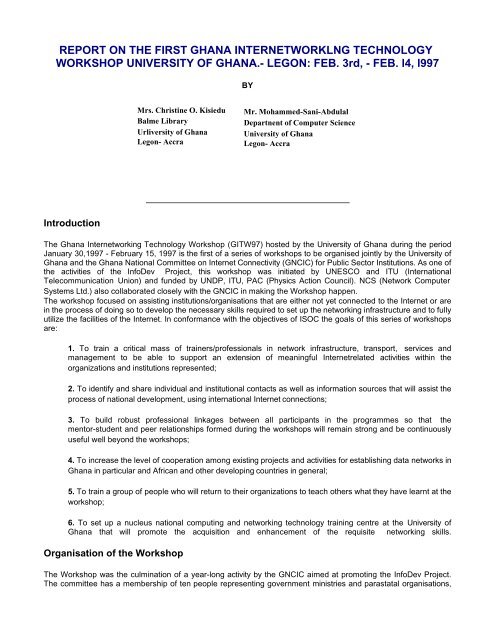
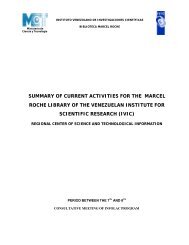
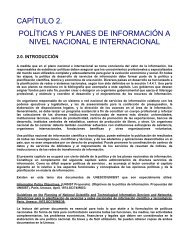
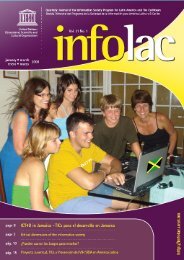
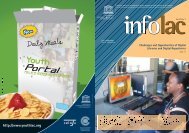
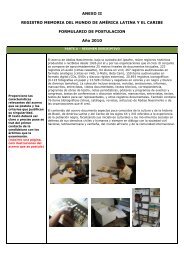
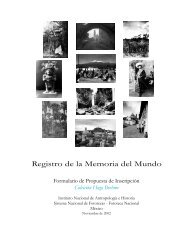
![ifaprep[1]. caribbean - Infolac](https://img.yumpu.com/37304916/1/184x260/ifaprep1-caribbean-infolac.jpg?quality=85)
